Items in Remembering Lincoln that are transcribed.
from Feb. 12, 1928
"Tragedy of Lincoln's Death Halted Feast of Rejoicing"
-
Full Title
"Tragedy of Lincoln's Death Halted Feast of Rejoicing"
-
Description
In 1928, Robert Brown recounted his childhood as the son of White House butler and waiter Peter Brown. Peter Brown, a formerly enslaved man, worked in the Lincoln White House. In the interview, Robert Brown discussed his early childhood in Virginia, his family's move to Washington, getting to know President Lincoln and his children, and learning of Lincoln's assassination. The newspaper page also includes other articles about Lincoln.
-
Transcription
[interviewer:] "Where were you on the night of the assassination?"
[Brown:] "I was home on Twelfth street., between O and H. about three or four blocks from Ford's. It was about half past 10 and I was taking off my clothes to go to bed. My father had just left the house, saying he had orders to return to the Executive Mansion about 11 and help with a supper they intended to have, and he would be beck when he could, but he didn't say what time. He went out and I was just ready to crawl into bed when I heard a big commotion in the street, men running this way and that, people shouting, military giving orders, horses dashing by. When I stuck my head out the door some one ran up, saying Mr. Lincoln was shot at the theater. My mother pulled me back in the house and made me stay in bed. She said it was dangerous to be out, and we should stay in. We kept awake till my father returned and told us of the excitement over at the White House. He stayed over there trying to comfort Tad, but after putting him to bed there wasn't anything he could do, so he locked up after a while and came home. Then I fell asleep."
[interviewer:] "Who was to have made up the party over at the White House?"
[Brown:] "That I couldn't say. My father just said they were to have some kind of supper after the performance, and he was needed there."
[interviewer:] "How many were invited?"
[Brown:] "That I don't know, sir. You see, my father wasn't the steward, otherwise he would have known how many. He only helped wait on the table in emergencies, and I can't say whether he was to do table duty that night."
[interviewer:] "Were the guests coming from Ford's Theater with the Lincolns or from elsewhere?"
[Brown:] "That, sir, is beyond me." -
Source
Chronicling America: Historic American Newspapers, Library of Congress
-
Rights
This item is in the public domain.
-
Tags
-
Cite this Item
George M. Battey, Jr.. ""Tragedy of Lincoln's Death Halted Feast of Rejoicing"". The Washington Star. Remembering Lincoln. Web. Accessed December 14, 2025. https://rememberinglincoln.fords.org/node/1214
-
Creator
George M. Battey, Jr.
-
Publisher
The Washington Star
-
Date
February 12, 1928
from Feb. 12, 1928
"Tragedy of Lincoln's Death Halted Feast of Rejoicing"

-
Description
In 1928, Robert Brown recounted his childhood as the son of White House butler and waiter Peter Brown. Peter Brown, a formerly enslaved man, worked in the Lincoln White House. In the interview, Robert Brown discussed his early childhood in Virginia, his family's move to Washington, getting to know President Lincoln and his children, and learning of Lincoln's assassination. The newspaper page also includes other articles about Lincoln.
-
Source
Chronicling America: Historic American Newspapers, Library of Congress
-
Rights
This item is in the public domain.
-
Creator
George M. Battey, Jr.
-
Publisher
The Washington Star
-
Date
February 12, 1928
from Apr. 21, 1865
Funeral Obsequies of President Lincoln
-
Full Title
Funeral Obsequies of President Lincoln
-
Description
This article was published in the Union Vedette, a newspaper published by United States soldiers stationed at Camp Douglas in Salt Lake City, Utah. It discusses a meeting in which the Utah territory's federal, civil, and military officials adopted multiple resolutions related to the Lincoln assassination and planned for the city's memorial service. It expresses grief over Lincoln's death and extols his "integrity and ability as a magistrate," while endorsing Andrew Johnson as the new president.
-
Transcription
Funeral Obsequies of President Lincoln
At a meeting of the Federal, Civil and Military officials of Utah, held at the Executive in Great Salt Lake City, April 18th at two P.M., Hon. J. Duane Doty, Governor, was called to the chair, Capt. C.H Hemstead and T.B. H. Stenhouse, Esq., appointed Secretaries.
After preliminary consultation and expression of feeling over the sad event which called this meeting together, the following resolutions. presented by Hon. Chief Justice Titas, were unanimously adopted:
Whereas, the death by assassination of our beloved President. has wrung the hearts of all good men with grief;
Whereas, the serious wounding, by lawless violence, of our esteemed and honored Secretary of State, and his two sons, mingles with the sorrow of actual bereavement, the painful apprehension of further heart-rending loss and;
Whereas, also, in this our hour of calamity, we may not inappropriately seek that relief which affliction finds in outward expression! Therefore,
Resolved. That we cannot suppress the profound sorrow, with which we lament the untimtely death of our beloved President Abraham Lincoln, whose integrity and ability as a magistrate had secured for him the confidence of his country and whose genial virtues as a man, had endeared him to humanity itself:
Resolved. That with unaffected grief for our lamented President, is mingled the poignant regret, that he has not been spared to see and enjoy the fruition of that peace which has his labors had done so much to secure for his country, and which we believe is not far distant;
Resolved, That while we thus lament for our friend, the exemplary husband and father. we cannot forget the stricken family, but with a feeling of unaffected condolence humbly invoke for them that support, which transcends all human woe, in the divine power of its consolation;
Resolved, That we devotedly hope that the wounds of our able and honored Secretary of State William H. Seward, and his two sons, may none of them prove mortal but that they may all soon be restored to health. and long spared for further useful service, to our common country;
Resolved. That we have the fullest confidence in our President Andrew Johnson, our own and the Nation’s choice, as he was for the second. prepared by labor and trial as he was for the first office in government. and to which he is thus translated by the peration of the Constitution and the permission of a tremendous Providence.
Resolved. That a committee of five be appointed on the part of the Federal offices to confer with a committee of like number on the part of the city authorities. to make arrangements for suitable religious exercises to be held at the Tabernacle, April 19th, at twelve o’-clock, M.
Col. J.C. Little informed the meeting that Elder Amasa M. Lyman had been selected by city authorities to deliver an address at the Tabernacle.
Oh motion, it was unanimously resolved the Rev. Normal McLeod be also invited to deliver an eulogium on the life, character and illustrious services of the late President, on the same occasion and at-the-same place.
In accordance with the foregoing resolutions the following gentlemen were appointed by the Chair as the Committee of Arrangements. viz: Hon. Chief Justice John Titus, Col. O. H. Irish, Capt Chas H. Hempstead, Col. Robt. T. Burton and Col. I C Little.
Following is the committee appointed on behalf of the city authorities. viz: Hon. Mayor Smoot, Alderman Sheets, Alderson Raleigh, Thos. McKeon and N. H. Felt, E-qs.
On motion, the Secretaries were instructed to transmit a copy of the proceedings of this meeting to the City Council, and that public notice be given of the exercises at the Tabernacle.
J. DUANE DOTY, President.
T.B.H. Stenhouse,
Chas H. Hempstead } Secretaries
[Transcription by Alicia B., Ford's Theatre Society, and Janet Scanlon.]
-
Source
Utah Digital Newspapers Contributed by McKayla Herron, M.A. Student in Public History, West Virginia University
-
Rights
This item is in the public domain and may be reproduced and used for any purpose, including research, teaching, private study, publication, broadcast or commercial use, with proper citation and attribution.
-
Tags
-
Cite this Item
Union Vedette. "Funeral Obsequies of President Lincoln". Union Vedette. Remembering Lincoln. Web. Accessed December 14, 2025. https://rememberinglincoln.fords.org/node/1211
-
Creator
Union Vedette
-
Publisher
Union Vedette
-
Date
April 21, 1865
from Apr. 21, 1865
Funeral Obsequies of President Lincoln
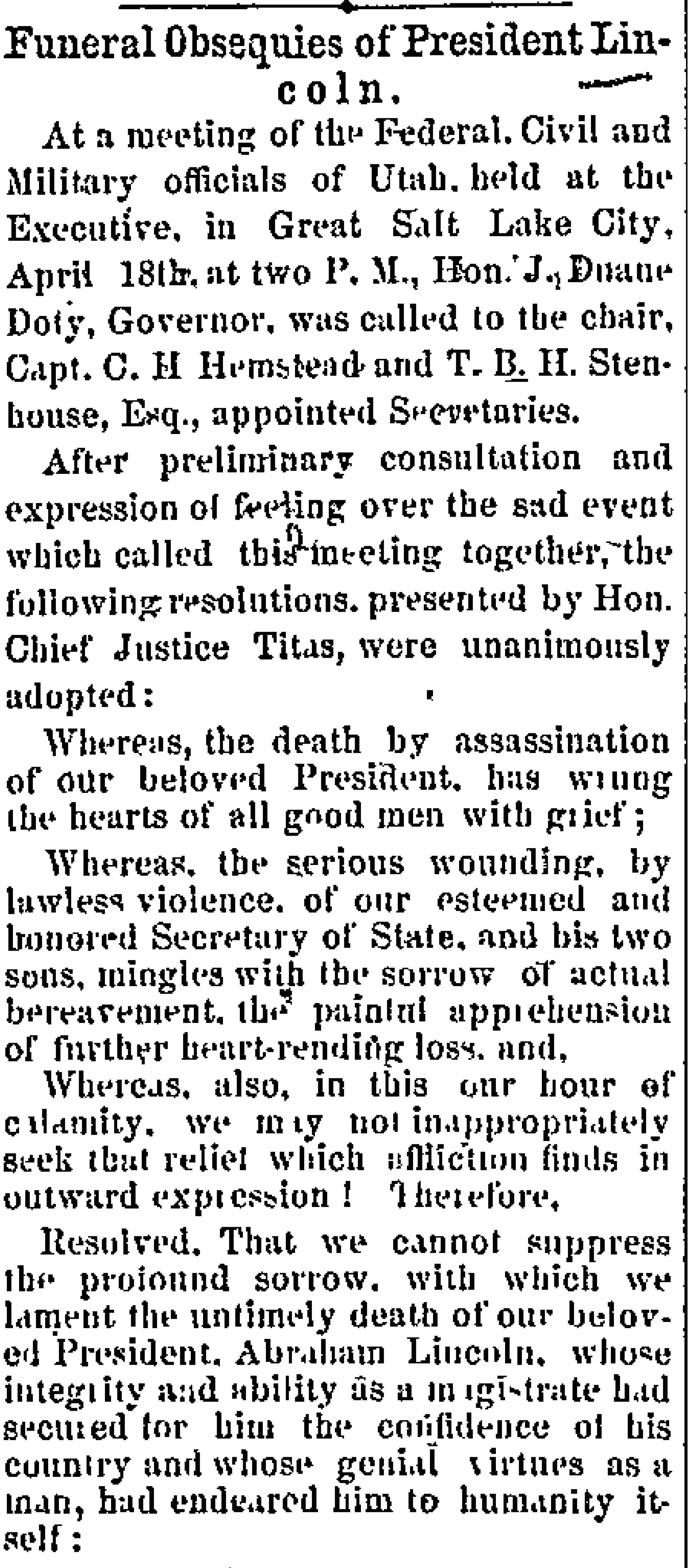
-
Description
This article was published in the Union Vedette, a newspaper published by United States soldiers stationed at Camp Douglas in Salt Lake City, Utah. It discusses a meeting in which the Utah territory's federal, civil, and military officials adopted multiple resolutions related to the Lincoln assassination and planned for the city's memorial service. It expresses grief over Lincoln's death and extols his "integrity and ability as a magistrate," while endorsing Andrew Johnson as the new president.
-
Source
Utah Digital Newspapers Contributed by McKayla Herron, M.A. Student in Public History, West Virginia University
-
Rights
This item is in the public domain and may be reproduced and used for any purpose, including research, teaching, private study, publication, broadcast or commercial use, with proper citation and attribution.
-
Creator
Union Vedette
-
Publisher
Union Vedette
-
Date
April 21, 1865
from Apr. 19, 1865
Home Items
-
Full Title
Home Items
-
Description
This article, published in Salt Lake City's Deseret News, discusses a Sunday church service held in the city a few days after Lincoln's assassination. Wilford Woodruff, F. D. Richards, and George Q. Cannon of the Church of Jesus Christ of Latter-day Saints each spoke on topics related to the assassination, including the uncertainty of human life, the country's mourning, and the privileges of American citizenship. Cannon compared the assassination of Abraham Lincoln to the murder of LDS Prophet Joseph Smith.
-
Transcription
HOME ITEMS.
SABBATH MEETINGS. – Elder Wilford Woodruff preached a highly instructive and truly edifying discourse upon the uncertainty of human life, the present mournful condition of our country, occasioned by the assassination of our Chief Magestrate, and the fearful state of feeling that must exist with those who plotted as well as those who carried out the murderous scheme.
AFTERNOON.
Elder F. D. Richards addressed the congregation upon the privileges and comforts enjoyed by American citizens, and stated that if they did not realize their blessings while at home, when that portion of them who were Elders in this Church went abroad on missions to the despotic nations of the Old World, they were made to understand the importance of American citizenship.
Elder George Q. Cannon followed upon the same subject and also reviewed the once unhappy sadness that prevailed in the Church of Jesus Christ of Latter-day Saints, consequent upon the perpetration of a like wicked but more dastardly act of cruel murder done in cold blood.
[Transcription by Alicia B., Ford's Theatre Society, and Janet Scanlon.] -
Source
Utah Digital Newspapers Contributed by McKayla Herron, M.A. Student in Public History, West Virginia University
-
Rights
This item is in the public domain and may be reproduced and used for any purpose, including research, teaching, private study, publication, broadcast or commercial use, with proper citation and attribution.
-
Tags
-
Cite this Item
Deseret News. "Home Items". Deseret News. Remembering Lincoln. Web. Accessed December 14, 2025. https://rememberinglincoln.fords.org/node/1210
-
Creator
Deseret News
-
Publisher
Deseret News
-
Date
April 19, 1865
from Apr. 19, 1865
Home Items
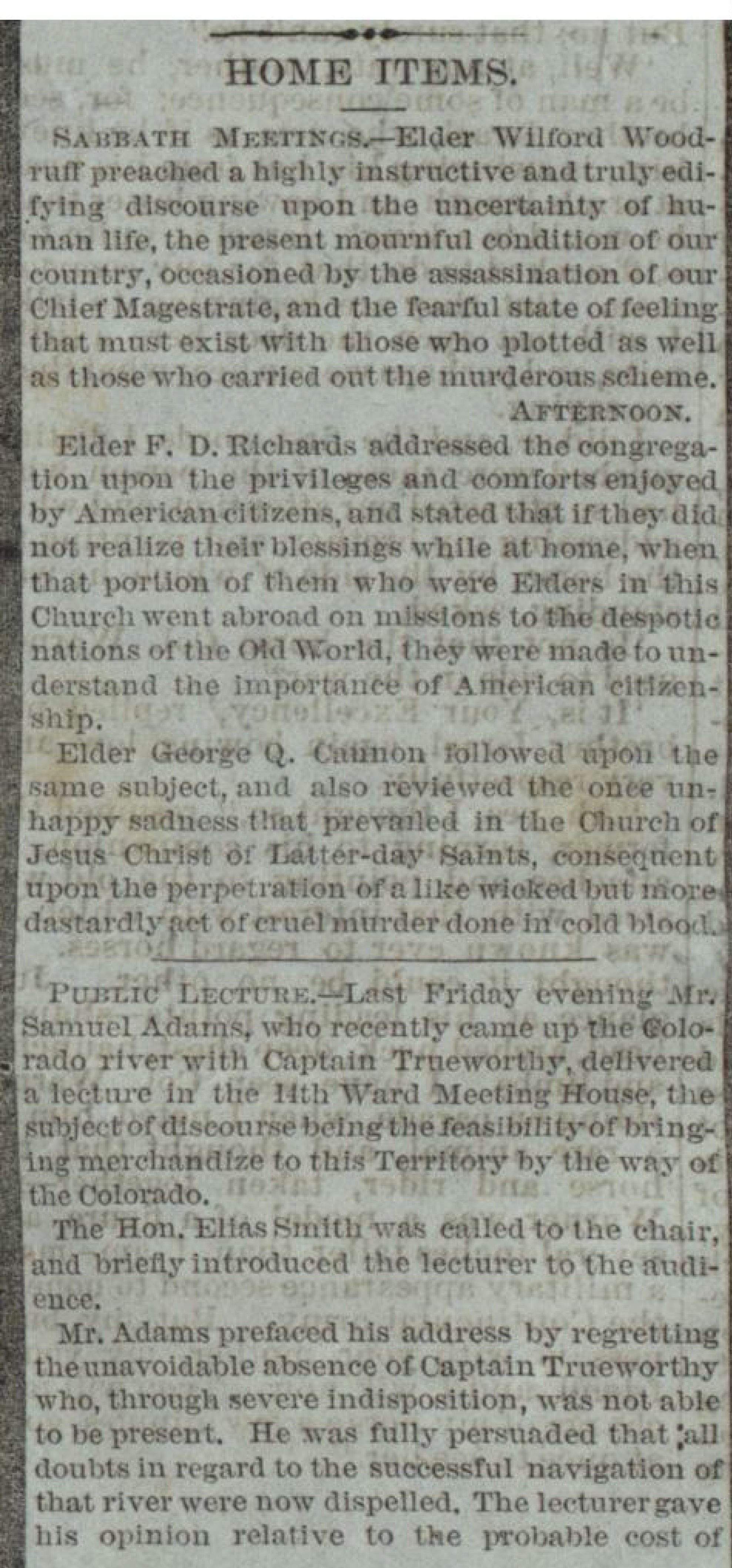
-
Description
This article, published in Salt Lake City's Deseret News, discusses a Sunday church service held in the city a few days after Lincoln's assassination. Wilford Woodruff, F. D. Richards, and George Q. Cannon of the Church of Jesus Christ of Latter-day Saints each spoke on topics related to the assassination, including the uncertainty of human life, the country's mourning, and the privileges of American citizenship. Cannon compared the assassination of Abraham Lincoln to the murder of LDS Prophet Joseph Smith.
-
Source
Utah Digital Newspapers Contributed by McKayla Herron, M.A. Student in Public History, West Virginia University
-
Rights
This item is in the public domain and may be reproduced and used for any purpose, including research, teaching, private study, publication, broadcast or commercial use, with proper citation and attribution.
-
Creator
Deseret News
-
Publisher
Deseret News
-
Date
April 19, 1865
from Apr. 19, 1865
"Our Nation Mourning"
-
Full Title
"Our Nation Mourning"
-
Description
This article was published in Salt Lake City's Deseret News on April 19, 1865. It describes the city's initial reaction to the Lincoln assassination, announcing a memorial service to be held in the Latter-day Saint tabernacle, the suspension of business and entertainment throughout the city, and the decoration of public buildings
-
Transcription
Upon the reception of the horrifying intelligence that President Lincoln had been assassinated, throughout the city business was generally suspended, flags were draped in mourning at halfmast, stores and other public buildings were closed and craped, the Management of the Theatre announced that the bill for Saturday evening was postponed to Monday, and deep gloom palpably rested upon the minds of the citizens.
On Sunday the stand and organ in the Tabernacle were clad in the habiliments of woe, as were also many members of the congregation, and Elders W. Woodruf, F.D. Richards and George Q. Cannon delivered feeling and appropriate addresses upon the solemn occasion. Monday evening the proscenium boxes of the Theatre and two large national flags arching from the center over the drop curtain were draped in black.
Alas for the times, when our Chief Magistrate can be stricken down by the hands of an assassin! -
Source
Utah Digital Newspapers Contributed by McKayla Herron, M.A. Student in Public History, West Virginia University
-
Rights
This item is in the public domain and may be reproduced and used for any purpose, including research, teaching, private study, publication, broadcast or commercial use, with proper citation and attribution.
-
Tags
-
Cite this Item
Deseret News. ""Our Nation Mourning" ". Deseret News. Remembering Lincoln. Web. Accessed December 14, 2025. https://rememberinglincoln.fords.org/node/1209
-
Creator
Deseret News
-
Publisher
Deseret News
-
Date
April 19, 1865
from Apr. 19, 1865
"Our Nation Mourning"

-
Description
This article was published in Salt Lake City's Deseret News on April 19, 1865. It describes the city's initial reaction to the Lincoln assassination, announcing a memorial service to be held in the Latter-day Saint tabernacle, the suspension of business and entertainment throughout the city, and the decoration of public buildings
-
Source
Utah Digital Newspapers Contributed by McKayla Herron, M.A. Student in Public History, West Virginia University
-
Rights
This item is in the public domain and may be reproduced and used for any purpose, including research, teaching, private study, publication, broadcast or commercial use, with proper citation and attribution.
-
Creator
Deseret News
-
Publisher
Deseret News
-
Date
April 19, 1865
from May. 22, 1865
Letter from Pablo Herrera
-
Full Title
Letter from Pablo Herrera to Mr. Hassaurek
-
Description
Pablo Herrera, foreign minister of Ecuador, expressed his nation’s condolences to the United States on May 22, 1865.
-
Transcription
Transcription is available through the Department of State Office of the Historian
-
Source
-
Rights
This item is in the public domain and may be reproduced and used for any purpose, including research, teaching, private study, publication, broadcast or commercial use, with proper citation and attribution.
-
Tags
-
Cite this Item
Pablo Herrera. "Letter from Pablo Herrera to Mr. Hassaurek". Remembering Lincoln. Web. Accessed December 14, 2025. https://rememberinglincoln.fords.org/node/1208
-
Creator
Pablo Herrera
-
Date
May 22, 1865
from May. 22, 1865
Letter from Pablo Herrera to Mr. Hassaurek
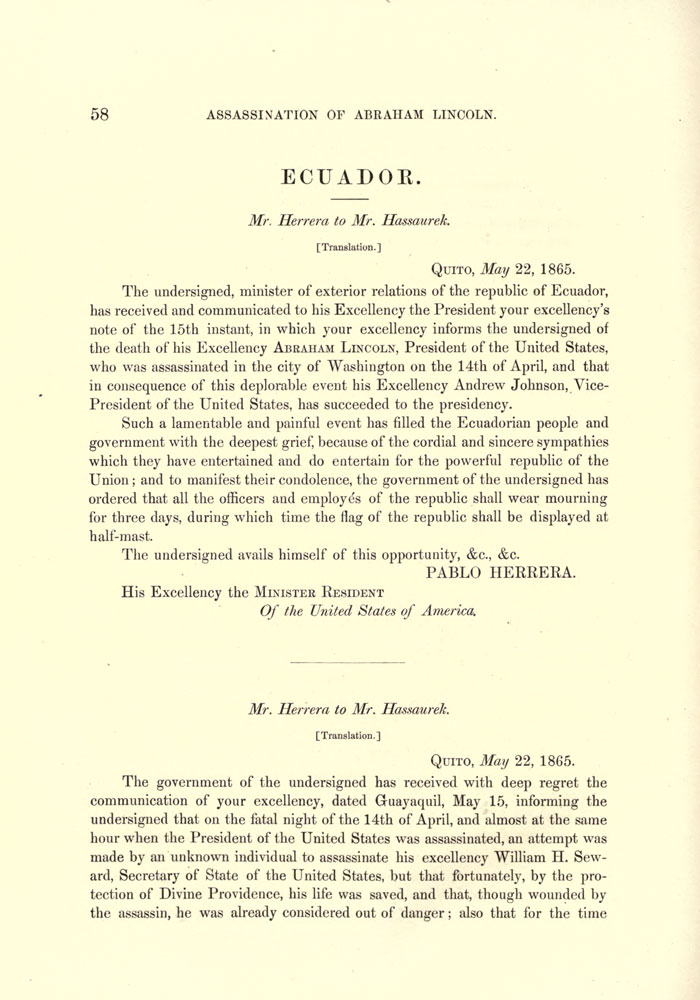
-
Description
Pablo Herrera, foreign minister of Ecuador, expressed his nation’s condolences to the United States on May 22, 1865.
-
Source
-
Rights
This item is in the public domain and may be reproduced and used for any purpose, including research, teaching, private study, publication, broadcast or commercial use, with proper citation and attribution.
-
Creator
Pablo Herrera
-
Date
May 22, 1865
from May. 9, 1865
From the Legation of His Imperial Majesty the Shah of Persia
-
Full Title
From the Legation of His Imperial Majesty the Shah of Persia
-
Description
A message from the legation of the Shah of Persia offering condolences on behalf of the leader and the people of Persia. The Shah transmitted this message via telegram to his emissary Suleiman Khan in Paris, who passed it along to the new President as a gesture of goodwill. Such a message demonstrates just how widely felt the impacts of Lincoln's death were.
-
Transcription
Transcription available through the Department of State Office of the Historian
-
Source
-
Rights
This item is in the public domain and may be reproduced and used for any purpose, including research, teaching, private study, publication, broadcast or commercial use, with proper citation and attribution.
-
Tags
-
Cite this Item
Suleiman Khan. "From the Legation of His Imperial Majesty the Shah of Persia". Remembering Lincoln. Web. Accessed December 14, 2025. https://rememberinglincoln.fords.org/node/1206
-
Creator
Suleiman Khan
-
Date
May 09, 1865
from May. 9, 1865
From the Legation of His Imperial Majesty the Shah of Persia
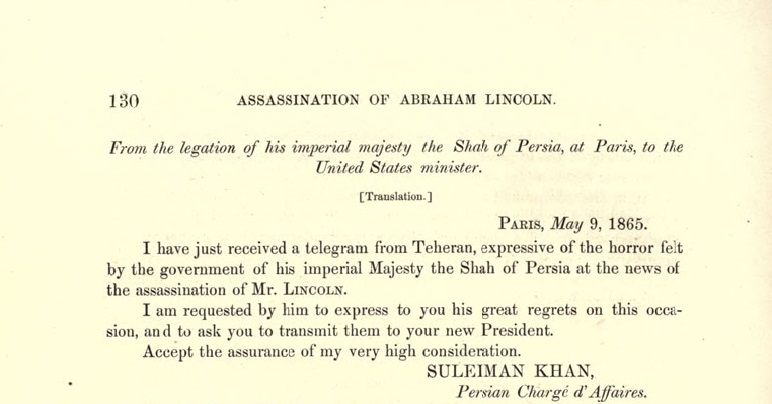
-
Description
A message from the legation of the Shah of Persia offering condolences on behalf of the leader and the people of Persia. The Shah transmitted this message via telegram to his emissary Suleiman Khan in Paris, who passed it along to the new President as a gesture of goodwill. Such a message demonstrates just how widely felt the impacts of Lincoln's death were.
-
Source
-
Rights
This item is in the public domain and may be reproduced and used for any purpose, including research, teaching, private study, publication, broadcast or commercial use, with proper citation and attribution.
-
Creator
Suleiman Khan
-
Date
May 9, 1865
from May. 2, 1865
Inhabitants of Zurich
-
Full Title
Inhabitants of Zurich
-
Description
A letter of condolences written to the US Government by a committee of residents from the Swiss city of Zurich. The committee praises the Union victory over the Confederacy, noting its impacts on not only the United States but also "all mankind". While mourning Lincoln, the document makes comparisons between Lincoln's impact and the previous global political impact of the Revolutionary War and George Washington. This letter provides a window into global reactions to the end of the war, as well as international opinions on what the role of a post-war United States would look like.
-
Transcription
Transcription is available via the Department of State Office of the Historian.
-
Source
-
Rights
This item is in the public domain and may be reproduced and used for any purpose, including research, teaching, private study, publication, broadcast or commercial use, with proper citation and attribution.
-
Tags
-
Cite this Item
O. Bulle. "Inhabitants of Zurich". Remembering Lincoln. Web. Accessed December 14, 2025. https://rememberinglincoln.fords.org/node/1205
-
Creator
O. Bulle
-
Date
May 2, 1865
from May. 2, 1865
Inhabitants of Zurich
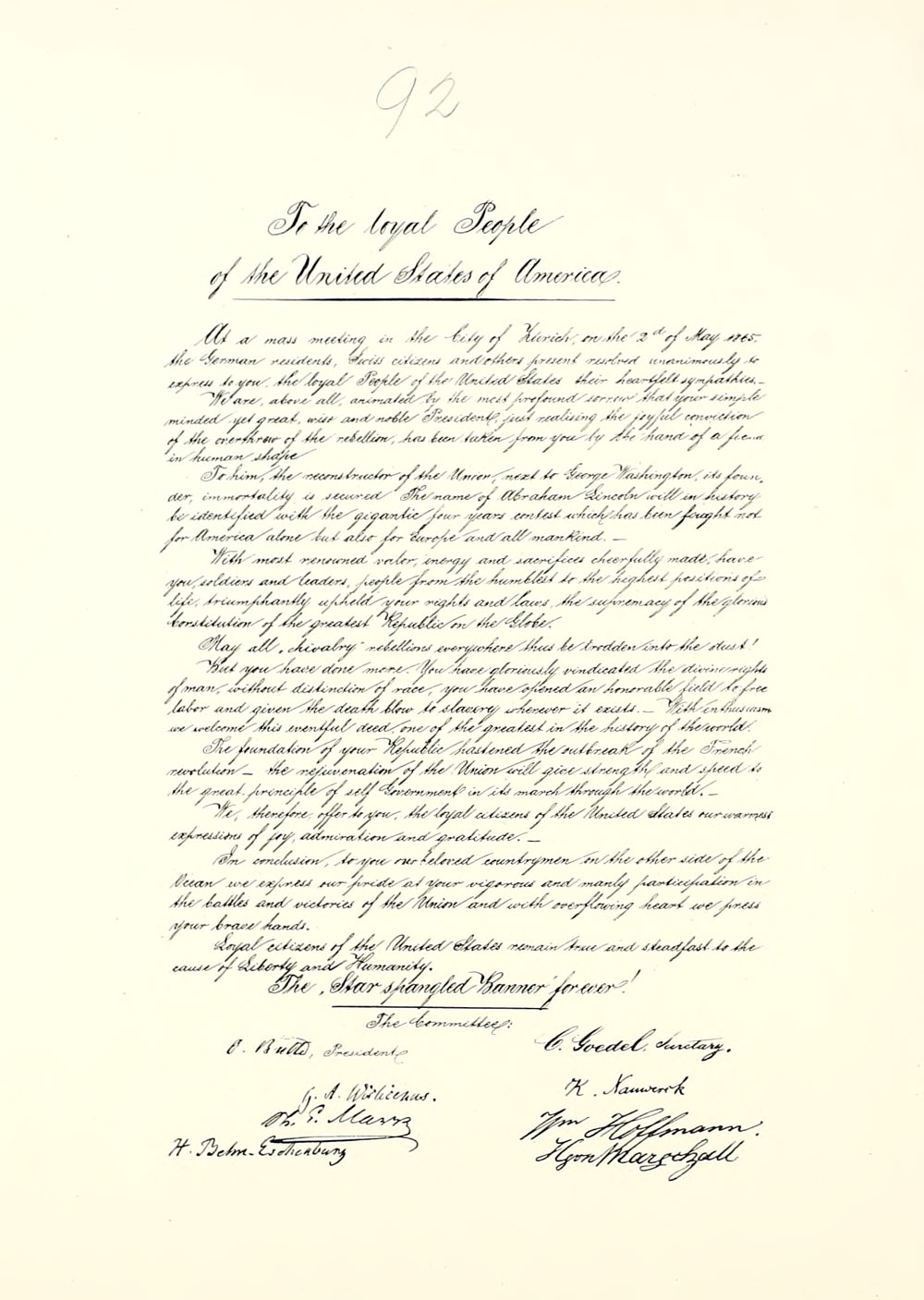
-
Description
A letter of condolences written to the US Government by a committee of residents from the Swiss city of Zurich. The committee praises the Union victory over the Confederacy, noting its impacts on not only the United States but also "all mankind". While mourning Lincoln, the document makes comparisons between Lincoln's impact and the previous global political impact of the Revolutionary War and George Washington. This letter provides a window into global reactions to the end of the war, as well as international opinions on what the role of a post-war United States would look like.
-
Source
-
Rights
This item is in the public domain and may be reproduced and used for any purpose, including research, teaching, private study, publication, broadcast or commercial use, with proper citation and attribution.
-
Creator
O. Bulle
-
Date
May 2, 1865
from Apr. 18, 1865
Office of Agent For C.S. Prisoners
-
Full Title
Office of Agent For C.S. Prisoners
-
Description
Letter sent by a Confederate prisoner of war named WM. S. Hawkins. Hawkins was a Confederate army colonel who was confined to Camp Chase, one of the largest POW camps in the Northern states. Hawkins expresses his regrets in regards to President Lincoln's fate, while voicing a desire for a post-war world in which the country was unified under principles of justice, mercy, and kindness.
-
Transcription
Office of Agent for C.S Prisoners, Camp Chase, Ohio, April, 18th 1865.
I desire, through your columns, to express my profound abhorrence of the deeds resulting in the death of President Lincoln. I wish also to mention that in passing through the prisons, where are still confined several thousand of my comrades, I heard of no one so fallen from the level of our common humanity as to be in any sense gratified at this atrocious murder. The sentiment on every side was that of indignation at so cowardly an attempt, and of regret at its successful completion.
In the name of Right, let the obloquy and the punishment fall in united horror upon the guilty, but not upon men who have had neither part nor lot in the matter; who, in other affairs, may have erred in judgement, but certainly not in heart, since countless sacrifices attest their sincerity; and whose strength, in case of ultimate Federal success, can be merged once more in the common resources far more readily by the Divine policy of brotherly kindness, than by any exercise of bitter and vindictive feeling.
Over the ark of a wise Government two seraphs bend - one of these is clear-eyed Justice, but the other is warm-hearted Mercy.
I am, sirs, very respectfully, your obedient servant,
WM. S. HAWKINS
Colonel, C.S.A. -
Rights
This item is in the public domain and may be reproduced and used for any purpose, including research, teaching, private study, publication, broadcast or commercial use, with proper citation and attribution.
-
Tags
-
Cite this Item
WM. S. Hawkins. "Office of Agent For C.S. Prisoners". The Louisville Daily Journal. Remembering Lincoln. Web. Accessed December 14, 2025. https://rememberinglincoln.fords.org/node/1204
-
Creator
WM. S. Hawkins
-
Publisher
The Louisville Daily Journal
-
Date
April 18, 1865
from Apr. 18, 1865
Office of Agent For C.S. Prisoners
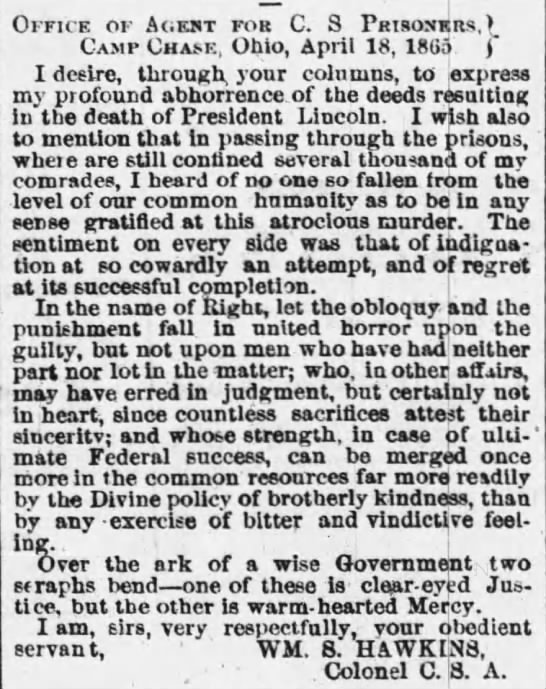
-
Description
Letter sent by a Confederate prisoner of war named WM. S. Hawkins. Hawkins was a Confederate army colonel who was confined to Camp Chase, one of the largest POW camps in the Northern states. Hawkins expresses his regrets in regards to President Lincoln's fate, while voicing a desire for a post-war world in which the country was unified under principles of justice, mercy, and kindness.
-
Rights
This item is in the public domain and may be reproduced and used for any purpose, including research, teaching, private study, publication, broadcast or commercial use, with proper citation and attribution.
-
Creator
WM. S. Hawkins
-
Publisher
The Louisville Daily Journal
-
Date
April 18, 1865
from Apr. 16, 1865
Sermon Preached in the African Methodist Episcopal Zion Church
-
Full Title
Sermon Preached in the African Methodist Episcopal Zion Church
-
Description
Sermon preached by Rev. Jacob Thomas in the African Methodist Episcopal Zion Church, Troy, New York. In this sermon, Rev. Thomas addresses his congregation and praises Lincoln as a true friend of African Americans while discussing what his loss means for the future. Rev. Thomas reflects on the grief of the African American community in regards to the assassination and how this was enhanced by Lincoln's status as a "friend of the oppressed."
-
Transcription
My friends, we meet at this hour with sad hearts. We have been stricken. The blow has fallen heavily upon us, and a nation mourns to day. Truly a prince and a great man in Israel has fallen. We cannot but weep bitter tears that so great and good a man as Abraham Lincoln, has been cut down in the midst of his usefulness by a death so cruel. At the moment he was about to realize the great results of his four years labor, just as victory had perched upon our banners, he fell a martyr to freedom. We shall never look upon his like again.
A few days ago joy and gladness filled every heart. All who were loyal to the government rejoiced and gave thanks to Almighty God because of the victory won, the downfall of the rebel capital. This intelligence was too glorious to be unalloyed. Ere our joy had subsided, sorrow overtook us. News reached us from Washington of the bloody deed perpetrated there. We would not believe it. It could not be possible that a creature in the form of man could be found so God-forsaken, as to take the life of the man who had malice for none but charity for all! The hours between the first rumor and the confirmation of the report, were hours of dreadful suspense. But the truth came at last. There was no longer room for doubt. It was too true, that on last Friday evening, whilst enjoying at a place of amusement a few moments of relaxation from toil, accompanied by his wife and a few friends, unconscious of danger near, he was brutally murdered — shot down by the cowardly hand of an assassin. Palsied be the tongue, withered be the arm of the guilty, execrable wretch who committed this, the blackest of all crimes. Yes, our dear President is no more. The beloved of his country, the father and friend of the oppressed, the champion of universal freedom, has fallen a victim to southern malice and revenge. Kind heaven weeps to-day over the bloody spectacle.
We, as a people, feel more than all others that we are bereaved. We had learned to love Mr. Lincoln as we have never loved man before. We idolized his very name. We looked up to him as our saviour, our deliverer. His name was familiar with our children, and our prayers ascended to God in his behalf. He had taught us to love him. The interest he manifested in behalf of the oppressed, the weak and those who had none to help them, had won for him a large place in our heart. It was something so new to us to see such sentiments manifested by the chief magistrate of the United States that we could not help but love him. Is it to be wondered at that we mourn today? Nay, we have seen old gray-headed men and young maidens weep because of this affliction. Had disease attacked him and he had passed away according to the natural course of nature, we could have consoled ourselves with the thought that it was God's will it should be so. But falling as he did by the hand of the wicked, we derive our consolation only from the assurance that by his uprightness, his honesty and his principles of Christianity, he is now enjoying that rest that remains for the just.
Our text is a fitting one for the occasion. A great man has fallen. From whatever stand-point we view Mr. Lincoln, we find in him the marks of true greatness. A few years ago this plain, homely lawyer was scarcely known outside of his own state. But how soon did he become the point of attraction. Not only was he the centre of observation in this country, but the civilized world was watching him. He far exceeded the expectations of all men. He became as the ark of safety to his country, the praise and glory of his fellow men. To us as a despised people, he was a second Moses — a second Daniel in wisdom. From a humble position in life he reached the very summit of honor, occupied the highest seat that it was in the power of the American people to give him, and filled that seat as no man ever filled it before him. The mind that conceived and drew up the Proclamation of Emancipation was a great mind. The results of this grand deed are patent to all. He was a philanthropist in the most extensive sense of the word — benevolent, kind, and ever ready to make others happy. One of the most prominent features in the character of our departed friend was his merciful disposition even towards his foes. He was strictly honest; this is admitted by his worst enemies. " Honest Abe," he was familiarly called by all classes. He was honest with his people, honest to himself, honest to his God. This is what God requires of all men, to be honest in heart. The exterior of this great man may have been plain, homely and awkward, but the interior was beautifully finished and furnished with Christian graces. It was his reliance upon God that carried him safely through the storm of four years duration. It was this that has made him blessed in the favor of God, forever.
Yes, Abraham Lincoln is no more, and we mingle our tears with those of the mourning widow and bereaved friend. We feel that in his loss our punishment is more that we can bear, yet in God is our consolation. Let us hope for the best. An all-wise God has permitted this great grief to come upon us. Let us look to him for deliverance in the time of our distress. We are humbled, we are mortified, we are brought very low. Our trust must be in God. Whilst we mourn, he whose, death we deplore, is enjoying the reward of his labor, happy with his God, mingling with those kindred spirits who went before him. The
two truest and greatest men that ever lived on earth, John Brown and Abraham Lincoln, have met in glory, and they cease not to give praise and honor to him that liveth forever and ever. The memory of Abraham Lincoln will ever be dear to us. It is engraved upon our hearts. It can never be effaced. He has been our true friend and we never can forget him. We feel as though God had raised him up for a special purpose, and that having accomplished the labor assigned him, he has gone to his rest. May God protect us and keep us from further evils. -
Source
A tribute of respect by the citizens of Troy, to the memory of Abraham Lincoln
-
Rights
This item is in the public domain and may be reproduced and used for any purpose, including research, teaching, private study, publication, broadcast or commercial use,with proper citation and attribution.
-
Tags
-
Cite this Item
Rev. Jacob Thomas. "Sermon Preached in the African Methodist Episcopal Zion Church". Young & Benson. Remembering Lincoln. Web. Accessed December 14, 2025. https://rememberinglincoln.fords.org/node/1203
-
Creator
Rev. Jacob Thomas
-
Publisher
Young & Benson
-
Date
1865
from Apr. 16, 1865
Sermon Preached in the African Methodist Episcopal Zion Church
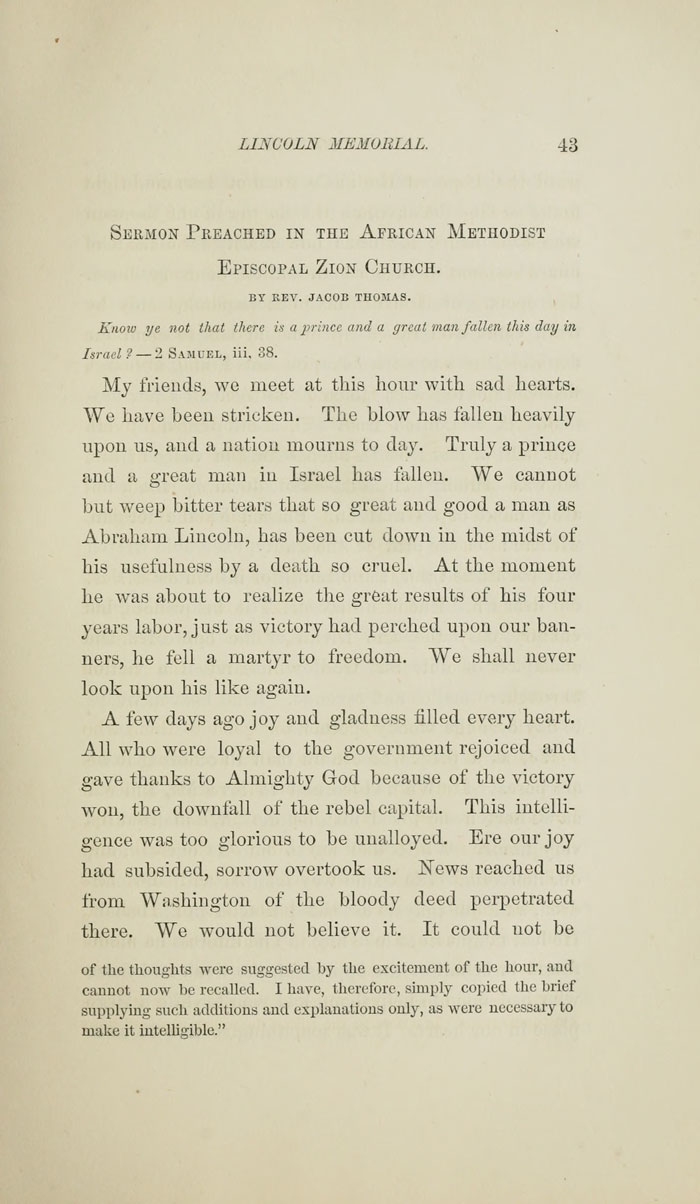
-
Description
Sermon preached by Rev. Jacob Thomas in the African Methodist Episcopal Zion Church, Troy, New York. In this sermon, Rev. Thomas addresses his congregation and praises Lincoln as a true friend of African Americans while discussing what his loss means for the future. Rev. Thomas reflects on the grief of the African American community in regards to the assassination and how this was enhanced by Lincoln's status as a "friend of the oppressed."
-
Source
A tribute of respect by the citizens of Troy, to the memory of Abraham Lincoln
-
Rights
This item is in the public domain and may be reproduced and used for any purpose, including research, teaching, private study, publication, broadcast or commercial use,with proper citation and attribution.
-
Creator
Rev. Jacob Thomas
-
Publisher
Young & Benson
-
Date
April 16, 1865
from Apr. 15, 1965
The Rebel Fiends at Work
-
Full Title
The Rebel Fiends at Work
-
Description
The Nashville Daily Union was one of the few newspapers that was established during and that survived the Civil War. This article prints a dispatch from Secretary of War Edward Stanton to Major General Dix recounting the details of Abraham Lincoln's assassination. The article falsely states that Edward Stanton was also killed. It concludes by declaring that a scheduled procession and illuminations in Nashville will not occur as a consequence of these events.
-
Transcription
NASHVILLE UNION
Extra.
Saturday Morning, April 15th, 1865.
THE REBEL FIENDS AT WORK.
President Lincoln Shot.
Secretary Seward Stabbed.
The President and Mr. Seward both Dead.
Grief of Mrs. Lincoln.
Seward’s Son and At-tendants Attacked.
Young Seward’s Skull Fractured.
Wilkes Booth the Pre-sident’s Assassin.
Seward’s Assassin Es-caped.
Nc Celebration in Nash-ville.
Washington, April 15th, 12:30 AM – The President was shot in the Theatre tonight; he is perhaps mortally wounded.
2nd DISPATCH – The President is not expected to live through the night. He was shot at the Theatre. Secretary Seward was also assassinated. No arteries were cut.
Washington, April 15.- President Lincoln and wife with their friends this evening visited Ford’s theatre for the purpose of witnessing the performance of American Cousin. It was announced in the papers that Gen. Grant would also be present, but he left by the late train of cars for New Jersey. The Theatre was densely crowded and every body seemed delighted with the scene before them. During the 3d act and while there was a temporary pause for one of the actors to enter, the sharp report of a pistol was heard which merely attracted attention but suggested nothing serious, until a man rushed to the front of the President’s box waving a long dagger in his right hand, and exclaiming Sic Semper Tyrannis and immediately leaped from the box which was in the second tier to the stage beneath and ran across to the opposite side of the stage, making his escape amid the bewilderment of the audience, from the rear of the theatre, and mounting a horse fled.
The screams of Mrs. Lincoln first disclosed the fact to the audience that the President had been shot, when all present rose to their feet, rushing to the stage, many exclaiming hang him. The excitement was of the wildest pos-sible description, and of course there was an abrupt intermission of theatrical performances.
There was a rush toward the Presi-dent’s box, when cries were heard stand back, give him air, has any one stimu-lants. After there was a hasty examina-tion it was found that the President had been shot through the head above and back of the temporal bone, and that some of his brain oozing out. He was removed to a private house opposite the theatre, and the Surgeon General of the army and the other sur-geons wer called to attend his condition. On an examination of the pri-vate box, blood was discovered on the back of the cushioned rocking chair, on which the President had been sit-ting; also, on the partition; and on the floor a common single-barreled pocket pistol was found on the carpet. A mil-itary guard was placed in front of the private residence to which the Presi-dent had been conveyed. An immense crowd was in front of it all, all deeply anx-ious to learn the condition of the Pres-ident. It had been previously announced that the wound was mortal, but all hoped otherwise. The shock to the community was terrible. At midnight the Cabinet, Messrs. Sumner, Farns-worth, Judge Bates, Gov. Oglesby, Gen. Meigs, Colonel Hayes and a few personal friends, with Surgeon General Barhea and his immediate as-sistants were around his bedside. The President was in a state of syncope, totally insensible and breathing slowly. The blood oozed from the wound at the back of his head. The surgeon used every possible effort of medical skill, but all hope was gone. The parting of his family with the dying Presi-dent is too sad for description. The President and Mrs. Lincoln did not start for the theatre ‘till fifteen minutes after 8 o’clock. Speaker Colfax was at the White House at that time, and the President stated to him that he was going although Mrs. Lincoln had not been well, because the papers had announced that Gen. Grant was to be present, and as Gen. Grant had gone north he did not wish the audience to be disappointed. He went with apparent reluc-tance, and urged Speaker Colfax to go with him , but that gentleman had made other arrangements and with Mr. Ash-mead of Massachusetts, bid him good night.
WAR DEPARTMENT, Washington, April 15.-Maj. Gen. Dix: Abraham Lincoln died this morning at 22 minutes past 7 o’clock.
E.M. Stanton
Secretary of War
New York, March 15, 9 A.M.
Intense sorrow is depicted on all countenances at the horrible events that occurred in Washington last night and the grief of all good men is apparent everywhere at the death of the President.
No flags were hoisted in this city this morning until the state of the President was known, when they were placed at half-mast.
People appear perfectly horrified and the utmost rage is undoubtedly felt towards all known secessionists and rebel sympathizers.
War Department 4, 10 A.M., April 1-
Maj. Gen. Dix:- The President continues insensible and is sinking. Secretary Seward remains without change. Fred K. Seward’s skull is fractured in two places besides a severe cut on the head.
The attendant is still alive but hopeless. Maj. Seward’s wounds not dangerous. It is now ascertained with reasonable certainty that two assassins were engaged in the hor-rible affair; Wilkes Booth being the one who shot the President, and the other, a companion of his, whose name is not known but whose description is so clear that he can hardly escape.
It appears from letters found in Booth’s trunk that the murder was planned before the 4th of March, but fell through then because the accomplice backed out until Richmond could be heard from. Booth and his accomplice were at the Livery Stable at 6 o’clock last evening, and left there with their horses about 10 o’clock or shortly before that hour. It would seem that they had for several days been seeking their chances, but for some unknown reason it was not carried into effect until last night. One of them has evidently made his way to Baltimore; the other has not yet been traced.
(Signed)
E.M. Stanton
Washington, April 15- When the excitement at the theatre was at its wildest height, reports were circulated that Secretary Seward had also been killed. On reaching this gentleman’s residence, a crowd and military guard were around its door, and on entering it was ascertained that the reports were based in truth. Everybody there was so excited that scarcely an intelligible word could be gathered, but the facts are substantially as follows: About ten o’clock, a man rang the bell and the call was answered by a colored man.
He said he had come from Dr. Veerdier, Secretary Seward’s family physician, with a prescription, at the same time holding in his hand a small piece of folded paper, and saying in answer to a refusal, that he must see the Sec-retary as he was intrusted with particular directions concerning the medicine. He still insisted on going up although repeatedly informed that no one could enter the chamber, he pushed the servant aside and walked has-tily towards the Secretary’s room. He was there met by Mr. Fred Sew-ard, of whom he demanded to see the Secretary, making the same repre-sentation which he did to the servant. What further passed inn the way of col-loquy is not known, but the man struck him on the head with a billy, severely injuring the skull and felling him almost senseless.
The assassin then rushed to the cham-bers, and attacked Mr. Seward, the pay-master of the United States Army, Mr. Hansel, a messenger of the State Depart-ment and two male nurses disabling them. He then rushed upon the Secretary who was lying in bed in the same room, and inflicted three stabs in his neck, but severing it is thought and hoped no arteries, though he bled profusely.
The assassin then rushed downstairs, mounted his horse at the door, and road off before an alarm could be given and in the same manner as the assas-sin of the President.
[Transcription by Alicia B., Ford's Theatre Society.] -
Source
Chronicling America: Historic American Newspapers,Library of Congress
-
Rights
This item is in the public domain and may be reproduced and used for any purpose, including research, teaching, private study, publication, broadcast or commercial use, with proper citation and attribution.
-
Tags
-
Cite this Item
The Nashville Daily Union. "The Rebel Fiends at Work". Remembering Lincoln. Web. Accessed December 14, 2025. https://rememberinglincoln.fords.org/node/1201
-
Creator
The Nashville Daily Union
-
Date
April 15, 1965
from Apr. 15, 1965
The Rebel Fiends at Work
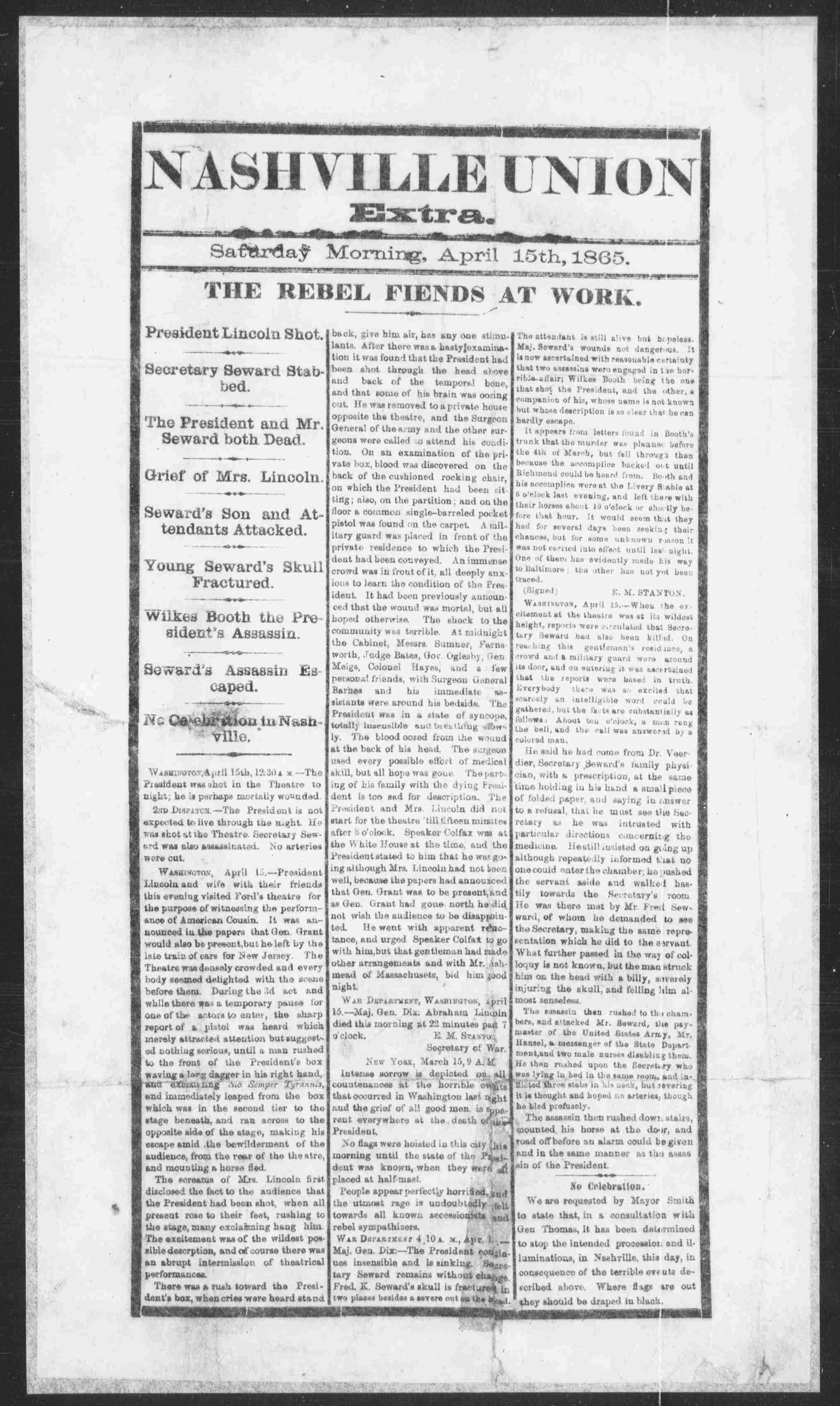
-
Description
The Nashville Daily Union was one of the few newspapers that was established during and that survived the Civil War. This article prints a dispatch from Secretary of War Edward Stanton to Major General Dix recounting the details of Abraham Lincoln's assassination. The article falsely states that Edward Stanton was also killed. It concludes by declaring that a scheduled procession and illuminations in Nashville will not occur as a consequence of these events.
-
Source
Chronicling America: Historic American Newspapers,Library of Congress
-
Rights
This item is in the public domain and may be reproduced and used for any purpose, including research, teaching, private study, publication, broadcast or commercial use, with proper citation and attribution.
-
Creator
The Nashville Daily Union
-
Date
April 15, 1965